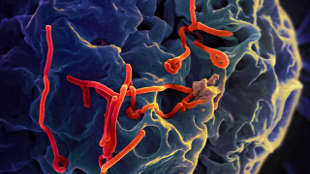 Ebola virusFLICKR, NIAIDThe Makona strain of Ebola virus that caused the recent outbreak in West Africa, killing more than 11,000 people and sickening even more, is apparently less virulent than the Mayinga strain isolated in Central Africa in 1976, according to a study of macaques published today (June 9) in the US Centers for Disease Control and Prevention journal Emerging Infectious Diseases.
Ebola virusFLICKR, NIAIDThe Makona strain of Ebola virus that caused the recent outbreak in West Africa, killing more than 11,000 people and sickening even more, is apparently less virulent than the Mayinga strain isolated in Central Africa in 1976, according to a study of macaques published today (June 9) in the US Centers for Disease Control and Prevention journal Emerging Infectious Diseases.
Researchers from the US National Institutes of Health and Bernard-Nocht-Institute for Tropical Medicine in Hamburg, Germany, infected three cynomolgus macaques with the 1976 Mayinga strain and another three with the 2014 Makona strain. Both groups of animals began shedding virus within three days of being infected, but those infected with the Mayinga virus progressed more quickly. On day four, they presented with a rash; by day six, they were extremely ill. These same symptoms appeared in monkeys infected with the Makona virus two days later—at days six and eight, respectively. Liver damage was also delayed by about two days in animals infected with the Makona virus, compared with those infected with the Mayinga strain.
“The main message is . . . it’s certainly not worse ...





















